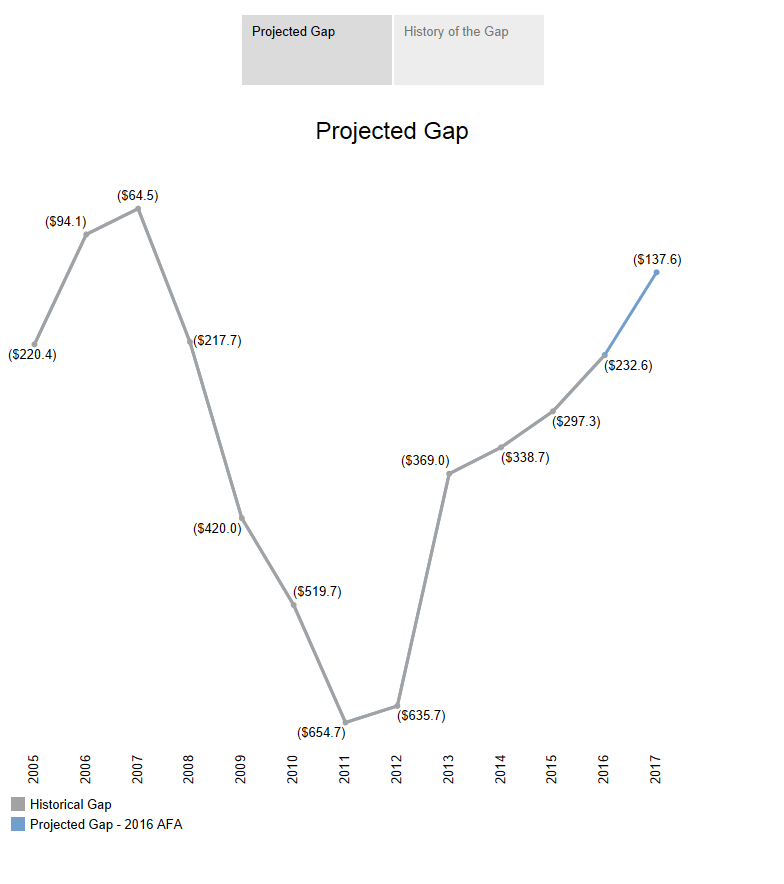Chicago Budget 2017 Shows Progress, but Large Challenges Remain
Tuesday, Mayor Rahm Emanuel presented the City of Chicago budget for FY 2017 to the City Council.
“This is a budget unlike any other in recent memory. It is free of an immediate pension crisis and free of the black cloud of insolvency threatening the retirements of City employees and the financial future of Chicago,” said Mayor Emanuel. “While the crisis has receded, our work of righting the ship is not complete, and we will also work to ensure we can invest in our future, tackle new challenges as they arise and drive prosperity in Chicago’s neighborhoods.”
The budget includes a preliminary shortfall in the City’s corporate fund of $137.6 million. While substantial, this is the lowest shortfall in nearly a decade, as shown in the chart below, courtesy of the City of Chicago Office of Budget & Management.
click to expand
A combination of revenue increased and cost savings have helped decrease this gap. The revenue projection for 2017 is expected to increase over the 2016 budget by $148 million. This is driven by growth in economically-sensitive revenue sources, like sales tax and personal property lease tax, coupled with growth in vehicle sticker tax revenue and changes to the State’s remittance of personal property replacement tax.
2017 proposed budget includes $33.7 million in government reforms and spending cuts, including:
- $9.4 million in energy savings
- $17.5 million in savings from zero based budgeting
- $1.3 million in savings from lease consolidations
- $3.5 million from the sale of excess City-owned land
- $2 million in savings from the implementation of printer and copier controls, reducing machine lease costs and printing costs
The Pension Problem
While much has been made of the $239 million increase in water & sewer taxes and a $543 million property tax increase, these revenues are set aside to begin correcting a nearly $34 billion net pension liability. These additional funds do stabilize pension obligations for the near future, but it is not clear that they will be sufficient to get the City’s pension funds out of the hole in the long term without further revenue increases, cuts to benefits, or increased employee contributions. This is reflected in the positive but cautious actions and comments on Chicago’s credit worthiness from ratings agencies, as S&P moved its outlook on Chicago general obligation debt from ‘negative’ to ‘stable’.

*Four pension funds are Municipal Employees’ Annuity and Benefit Fund (MEABF); Laborers’ and Retirement Board Employees’ Annuity and Benefit Fund (LABF); Firemen’s Annuity and Benefit Fund (FABF); Policemen’s Annuity and Benefit Fund (PABF); Source: Annual Financial Analysis FY 2017, City of Chicago Office of Budget & Management
Long Term Outlook
Much work remains to bring security to the City of Chicago’s long term fiscal outlook, and taxpayers must continue to hold their elected officials accountable. Mayor Emanuel reflected these sentiments:
“For too long Chicago was not honest with taxpayers and employees about the true cost of their pensions, and we allowed that dishonesty to turn into a real financial burden…I want to caution all of us, given all the hard work of the past five years, the risk of going back to what was politically easy has not been cleansed from the budget process. Because when a crisis recedes, it is natural to become complacent and take your eye off the ball. This is an admonition to myself, it is an admonition to my cabinet, their departments, and it is an admonition to all of you. We collectively have to stay vigilant in making the fiscally difficult choices and not allow ourselves to slide back to the bad practices that got us into this crisis in the first place.”
by Jeffrey L Garceau

